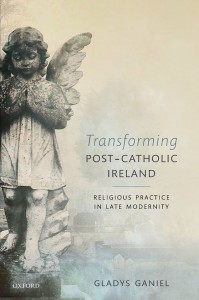 Tom Inglis, Professor Emeritus of Sociology at University College Dublin, has reviewed my latest book, Transforming Post-Catholic Ireland: Religious Practice in Late Modernity (Oxford, 2016) in the academic journal Journal of Contemporary Religion, V32(3) September 2017.
Tom Inglis, Professor Emeritus of Sociology at University College Dublin, has reviewed my latest book, Transforming Post-Catholic Ireland: Religious Practice in Late Modernity (Oxford, 2016) in the academic journal Journal of Contemporary Religion, V32(3) September 2017.
I have reproduced portions of the review below.
Tom Inglis Reviews Transforming Post-Catholic Ireland
… In this insightful and intelligent book, Gladys Ganiel suggests that we think of Ireland as post-Catholic. In doing so, she does not argue that there is nothing left of the Catholic Church or Catholicism in Ireland, but rather that the type of legalistic, authoritarian institutional religion that was dominant up until the 1970s has almost disappeared. In the same way perhaps that there are die-hard Communists in Eastern Germany, there are still die-hard Catholics in Ireland. However, in Ganiel’s terms, as well as these traditional types, there are also new alternative and creative Catholics. All that was solid about the Catholic Church has not melted into air but has fragmented into vibrant, dynamic new forms. It is these new forms of what she calls extrainstitutional religion that she sets out to describe and analyse.
Before doing so, she describes what led to the demise of institutional religion in the first place. This is an erudite analysis. As well as the usual factors of the media, the changing position and role of women, and the clerical child sexual abuse scandals, she draws attention to the inability of the Catholic Church to respond to the needs and interests of the laity. This is important, but the notion of the Church responding to the religious market has been, and may always be, anathema to the way it sees itself. The Church has never really adapted to changing identities and the new diversity in the religious field.
… There is plenty of evidence to suggest that most Irish Catholics have moved away from a legal-orthodox form of religiosity to become cultural Catholics, that is they see being Catholic as part of their cultural heritage and social identity rather than as a means to salvation. However, Ganiel is looking for evidence of critically reflective, vibrant Christians—some more Catholic, some more Protestant—who are creative in their way of being religious. In seven key substantial chapters, Ganiel describes and analyses examples of religious groups who represent this move towards individualisation and extra-institutional, or beyond Church, religion, particularly in terms of how they deal with diversity, reconciliation, and ecumenism. One gets the impression from the wide range of people Ganiel interviewed, from their reflections and the stories they tell, that the institutional Church Catholic in Ireland is dying and that Irish Catholics are becoming more Protestant.
Ganiel sees these groups as central not just to the regeneration of the religious field in Ireland, but also to the creation of a mature, democratic civil society throughout the whole island. In doing so, she follows Habermas’s argument that, while democracy and debate in the public sphere have to be based on reason, religion will always be a major source of meaning and of what it is to live a good life. In this way religion necessarily informs and structures discussions and policies about social issues.
Sounds a fascinating book which I look forward to reading. Congratulations Gladys